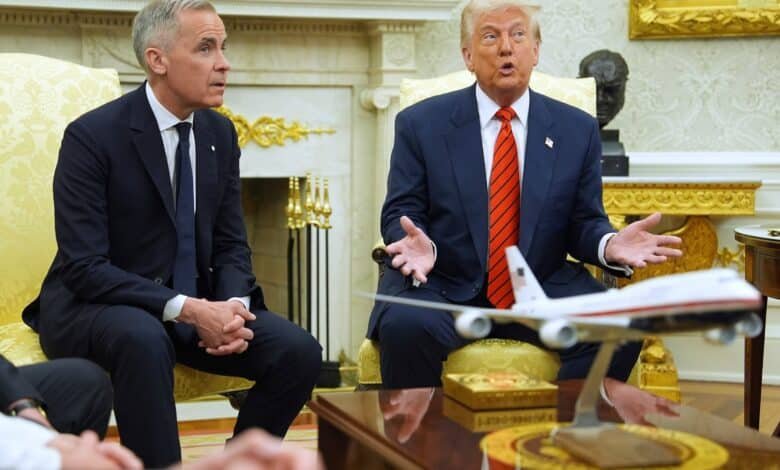Carney says Canada “ Not to sell ‘after Trump pushed the 51st condition in the Oval Office meeting

On Tuesday, Canadian Prime Minister Mark Carney said on Tuesday that President Donald Trump in the Oval Office that Canada was “not for sale” after Trump had repeated his statement that he should become the 51st state.
“As you know in real estate, there are places that are not for sale. And Canada is not for sale, it will never be for sale,” Carney told Trump. “But the opportunity is in partnership and what we can build together. And we have done so in the past.”
Trump, however, has still not dropped the idea.
“Time will tell us. It’s only time. But I never say,” said Trump in the tense exchange. “I had a lot, a lot of things that were not achievable and they ended up being achievable and only doable in a very friendly way.”
Carney stressed that Canada’s position “will not change” on the issue, before pivoting to negotiate discussions.
Trump said that there was nothing that Carney could not say at the meeting on Tuesday which would raise the prices, which include a 25% levy from Canadian goods which do not comply with the agreement of the United States-Mexico-Canal (USMCA) and other samples from cars, oil, steel and aluminum.
“It’s like that,” Trump told journalists.

President Donald Trump meets Canadian Prime Minister Mark Carney in the White House Oval Office on May 6, 2025 in Washington.
Evan VUCCI / AP
Carney, who has just won an election to replace Justin Trudeau largely because of his anti-Trump platform, tried to persuade Trump that Canada is crucial for the United States as one of its largest business partners.
“There are much greater forces,” said Carney on trade. “And it will take some time in certain discussions. And that is why we are here to have these discussions.”
After Trump said “We don’t do much business with Canada from our point of view-they do a lot of business with us,” said Carney, saying: “We are the biggest customer in the United States in all goods. So we are the biggest customer in the United States.”
The historically friendly relationship between the United States and Canada stretched out in Trump because of its pricing war and its redemption.
An advantage for Carney compared to his predecessor entering Tuesday’s meeting was his lack of history with Trump. Trudeau has left his post with a bruised relationship with the president, who Trump has triooll on several occasions as “governor” rather than Prime Minister. The two leaders could not conclude a pricing agreement.
Before the back and forth of Trump’s push to make Canada the 51st state, the two men took a fairly cordial tone at the start of their Oval Office meeting.
Trump congratulated Carney for his victory, saying that “Canada has chosen a very talented person, a very good person”.
“It’s very friendly,” said Trump about their plate. “It will not be like – we had another little explosion with someone else,” added Trump, referring to his oval office with Ukrainian President Volodymyr Zelenskyy earlier this year.

President Donald Trump welcomes Canadian Prime Minister Mark Carney when he arrived at the White House in Washington on May 6, 2025.
Mandel and / AFP
However, a 25% rate imposed by Trump remains in place for Canadian goods that do not comply with (USMCA) as well as a 10% rate on Canadian oil imports and 25% price on all cars, car parts, steel and aluminum.
Canada’s reprisal action includes a 25% rate on vehicles imported from the United States which does not comply with USMCA. In March, Canada imposed a value of $ 21 billion in reprisals was applied to items such as American orange juice, whiskey, peanut butter, coffee, devices, shoes, cosmetics, motorcycles and certain paste and paper products.
Canada also has a lot to lose if Trump follows with threatening 100% prices on the films produced outside the United States
Trump continued to rent the USMCA and said the United States and Canada would have upcoming talks over the next year to renegotiate or terminate the agreement.
Carney said there were things that they had to “change” in the agreement.
“It is a base for a wider negotiation. Some things on this subject will have to change. And part of the way you have carried out these prices have benefited from the existing aspects of the USMCA. So there will have to change. There are other elements that have come, and that is part of what we are going to discuss,” said Carney.





